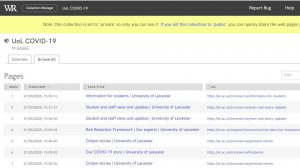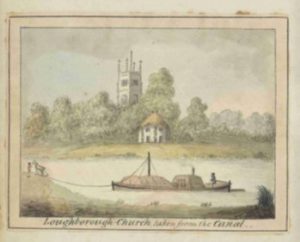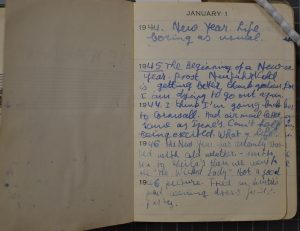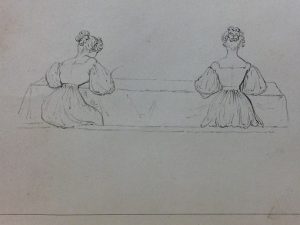Seeing other institutions’ reactions to the coronavirus pandemic has encouraged the Archives & Special Collections team to think about what we can do to collect Leicester’s responses to it, both official and personal.

Screenshot from the Archives & Special Collection’s WebRecorder account, May 2020, showing pages saved for the archives.
While I (Vicky) have been busy experimenting with WebRecorder to collect the University’s Covid-19 response pages, and saving emails detailing the official plans and initiatives, I was very conscious that we also need to hear directly from students and staff about how the pandemic has affected them. I have been in touch with some staff members who have taken photographs or film of the deserted campus, and if you are a staff member and would like to submit anything to us – including written reflections on this strange time – then please get in touch!
The request for sessions for Leicester Fiesta 2020 seemed a good chance to show some of the more personal collections we have in the archives, albeit through a screen, and encourage students to think about writing down some of their responses to the pandemic for the archive. So Sarah Wood and I presented a short talk on the variety of handwritten and private records we have in the collections, and how these can really help you to see events through someone else’s eyes.
One of the most famous series of diaries we hold are those of Adrian Mole, both in their published form and the scores of research and draft material of his creator Sue Townsend (catalogue reference ST). I wonder what both Sue and Adrian would have made of the last few months – I think a certain journey from London to the north east might have been commented on…..

“Loughborough Church taken from the Canal.” Sketch from “Excursions into Leicestershire and Staffordshire ” – handwritten and illustrated accounts of his journeys by William Fry (1763-1849) – showing a delightful scene, in Loughborough, 1828.
A fellow Leicester author, Joe Orton (collection reference MS 237 ), is represented by both a teenage diary which is fairly mundane, and a detailed record of a trip to Tangier in 1967. Orton’s agent requested that he wrote up his trip with a view to it being published, so it is worth bearing this in mind when reading it! It’s interesting that all diaries seem to mention the weather- this also goes for the travel diaries of William Fry (MS 149). He made journeys from London to Canterbury and Margate in 1826, around Leicestershire & Staffordshire in 1827, Loughborough and Liverpool in 1828 and Leicestershire again, in 1829. Accompanying his detailed notes on each day are small sketches or engravings of what he travelled past – it would be interesting to compare what he saw with how the landscape looks now.

First page of Helga Bejach’s diary (acc 2019/21); there is space for 5 years’ worth of entries but Helga wrote mainly between 1944 and 1946.
A wonderful recent acquisition to the archives was a handwritten diary written from 1944- 1946 (acc. 2019/21). It is written in English by Helga Bejach, who had come on the kindertransport from Germany to England in 1939 when she was 11. She was fostered by the Attenborough family (Frederick was Principal at Leicester University College from 1932-51) until her departure to America in 1945. I love that despite the awful and tumultuous times Helga was living through- she had to leave her her father and older sister in Berlin and later found that they had died in the holocaust- her diary is very much a typical teenager’s. “Life boring as usual” is the first entry on 1 January 1944. There are many details of her daily life – cleaning, shopping, eating, holidays and then the odd mention of world events – the war in Japan ending and whether it was likely that she and her sister would go back to Germany or not.
Some of our oldest personal writing is probably Rebecca Dixon’s recipe book of c. 1802 (MS 27). It contains many different recipes for savoury and sweet dishes – some more appetising than others- potted eels or calves’ head hash anyone? Some recipes illustrate a surprisingly cosmopolitan diet – Welsh “ryes”; German puffs; soup with vermicelli; Dutch curd and how to dress carrots the Dutch way; Scotch collops; Indian pickle; Seville orange pudding; Madeira wine and Portugese cakes. There are also various instructions for things we would now usually go to a chemist or doctor for – salve for a burn; a recipe to stop any sudden bleeding, “Dr Hepbounds’ receipt for a pain of stomach” and a never failing cure for the jaundice. We forget in these days of multiple celebrity recipe books, and being able to look up virtually anything online, how important it was hundreds of years ago to write these things down so you did not have to remember them. It was also a good way of passing family favourites on!
Moving to the second part of the session, Sarah and I talked about some of the challenges of using personal archives in research and managing them in collections, including bias and accuracy, the risk of revealing sensitive details about other people and how sometimes the meaning of jokes, acronyms and abbreviations can get lost in the past. We finished with some further reading – when we are back in the building, the library has many diaries, biographies and autobiographies, and in the meantime you could explore some TV adaptations on Box of Broadcasts (BoB).
We are very much hoping that reading this will encourage you to think about noting down some of your own thoughts on the pandemic and how it has affected you. If you would like to get involved, please read on.

Image of incorrect (left) and correct (right) positions for writing, from “Exercise for Ladies….” Donald Walker, 1837 (reference SCS 03204).
We are interested in what your life was like before the pandemic, how it has changed, and how you feel about it all. Do bear in mind that if your material is accepted into the archives, it will be permanently retained and made available to researchers. You may request for the material to be held anonymously or for it to be closed for a period, but you may want to think before you start writing about how this material could be made available to researchers straight away. It’s best to use initials or pseudonyms when writing about other people – or remove those parts completely and don’t submit anything which you would not want other people to see. It’s ok, in fact, it’s encouraged, to talk about details that you may think of as boring or mundane – the food you eat, the weather, going shopping, what you are reading or listening to, the exercise you have taken, your daily routine – in 100 years these may all seem very different!
We will ask you to read our terms and conditions of deposit and sign a deposit agreement at the point of accessioning, so please leave us contact details that will still be valid after you have left University. We are able to take digital formats (word or PDF documents, photographs) immediately, but need to wait until the lockdown is over before we can receive hard-copy items. Please get in touch with us at specialcolls@le.ac.uk if you would like any more information, or want to contribute something.
The presentation this blog was based on can be viewed at here . Happy writing everyone!

 Subscribe to vholmes's posts
Subscribe to vholmes's posts
Recent Comments